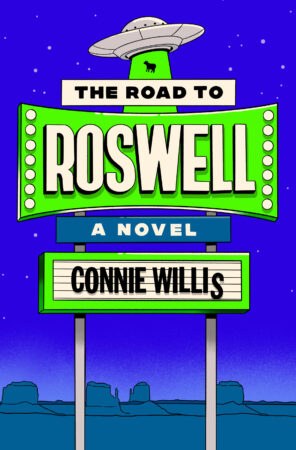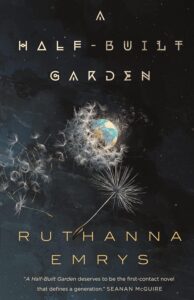I have been woefully neglectful of keeping up with reviews for recent reading, science fiction or not, but there’s only one way to rectify that situation, so here are some reviews of recent reads, including The Road to Roswell, A Half-Built Garden, and Summer’s End.
The Road to Roswell, by Connie Willis – Francie arrives in Roswell, New Mexico as the maid of honor in her college roommate’s UFO themed wedding (the groom is the true-believer, and Francie thinks there’s a fair chance the ceremony will implode). Frustrated by the crowds of gullible conspiracy nuts chasing potential alien sightings, Francie is surprised to find herself abducted by an alien. It looks like a tumbleweed, but it’s got quick and almost infinitely elastic tentacles, and it needs her to drive a car. Where? That’s what Francie needs to figure out. Along the way, they accumulate a rag-tag group of additional inadvertent abductees, and they all try to figure out how to communicate with the alien, which they’ve nicknamed Indy (after Indiana Jones and his whip).

This is old fashioned stuff, almost to a fault (and probably would be to a lot of the modern SF crowd), but I found it almost refreshing in that way. It’s got a nice blend of genres ranging from alien first contact/abduction/conspiracy, to romance, to a road-trip adventure, to comedy, and more. The UFO nut crowd is in for a healthy dose of merciless mockery, but given the light-hearted tone, it all works reasonably well. Willis relies perhaps a bit too heavily on dialogue, much of it centered on trying to figure out how to communicate with Indy, find out where he’s going, and why. This might bog things down for some folks, but the story’s got a lot of heart, and the logistics of how they learn to work with Indy are clever and well-thought out. He’s an interesting creation, and not something we’ve seen before, which is always a nice touch in a first contact story. It’s not super-deep or earth-shattering, but it’s a fun little caper with some clever SF embedded and worth a look for fans of Willis working in a more light-hearted mode.
A Half-Built Garden, by Ruthanna Emrys – Judy is awakened to a warning of unknown pollutants in the Chesapeake Bay. Assuming it’s a false alarm, she investigates only to find the first alien visitors to Earth. They’ve crossed the galaxy to save humanity from itself. As a technological society, they say we can’t help but destroy our planetary ecosystem, so it’s better for us to live among the stars, where we can control all the variables and establish a more sustainable community. But earth has found a hard-fought balance with nature, thanks to a revolution that sidelined corporations and set about healing the planet. Will the aliens recognize these actions for what they are, or will they save us… by force!? More importantly, why didn’t the aliens use the pronoun badges that Judy’s wife thoughtfully laid out upon their first meeting?

Alright that last bit is a dig on this story’s ham-fisted attempts to incorporate gender fluidity into a first contact story, but it’s well deserved. I honestly don’t know what this book is really going for though. The first contact dilemma (leave the planet or stay and potentially be forced to leave by the aliens) is bizarrely established as an all-or-nothing choice and the obvious solution, which every reader will develop within like 5 seconds of hearing the dilemma on page 20 (or whatever), is treated like a revelation at the end of the novel. It’s incredibly frustrating that everyone seemingly accepts the framing as an all-or-nothing decision (maybe I’m being too harsh, as there is some debate about whether or not to take the aliens up on their offer – the corporations are totally into it, for instance – but the aliens don’t seem to be very flexible on the matter, which seems weird).
There’s some notion of how the climate revolution has changed the relationship between corporations, nation states, and watershed communities (the new ecologically sound communities that are healing the earth), but it’s all very hand-wavey – there was something called the Dandelion revolution which apparently set us on the right ecological track for reversing the damage of global warming, but there is nothing about how that is actually accomplished other than bland platitudes.
Decision-making is also a big deal in this world and they describe some revolutionary networked technology that is supposed to facilitate these decisions, but this generally feels like every decision becomes a reddit thread that only experts are allowed to contribute to or something. This is a little silly, but it’s at least in good company – this sort of thing has been peppered into tons of science fiction for several decades (even going back to Ender’s Game and A Fire Upon the Deep, where the solution looked more like usenet than Reddit, but still.) It would be nice if the novel published in 2022 progressed things a little more than this does, but it’s not a deep fault or anything.
The real purpose of the novel, and the bulk of its prose, seems to be an exploration of gender ideology and sexual fluidity. There are several different systems at play, and a lot of time is spent… well, not exactly exploring these differences. Everyone is super defensive about their gender and sexual identities, to the point where they often refuse to explain in more detail, even to aliens who are clearly confused by what they’re seeing. Tons of lecturing and scolding about how this or that question is rude and offensive and so on and so forth. It’s so weird that this is the approach.
Speaking of the aliens, they’re actually multiple species, some plant-based, others more, er, spidery, and so on. But they speak perfect English from day one, and while their society seems to prioritize mothers more than ours, they are basically small variations on humans, with no real “alien” characteristics other than their bodies. Maybe if Judy’s wife put out xenogender pronoun badges, things would have gone better.
The book blurb calls Ruthanna Emrys a literary descendent of Ursula K. Le Guin, and boy does that comparison not do her any favors. There’s plenty of room for explorations of gender and identity in SF, and Le Guin was pretty great at it (there’s a reason The Left Hand of Darkness is often cited in this conversation) and lots of other SF authors have found ways to do it that are simultaneously less preachy and yet more informative (even when it comes to pronouns). Clearly this wasn’t a book for me, and it seems to be a bit divisive in that respect, but even if I were really into gender ideology, I don’t think I’d like this very much.
Summer’s End, by John Van Stry – A freshly minted spaceship engineer is forced to take the first berth off of Earth he can find because his stepfather is a politician who wants to have him killed. He ends up on a small freighter plying trade routes throughout the solar system, dodging assassins, pirates, and criminals along the way.
This starts off promisingly enough, if a bit derivative, but it quickly bogs down into some rather severe problems. One is that everything that happens is seemingly coincidental, and our hero just happens to be perfectly suited towards the situations he’s faced with. Alright, fine, that’s not always a major problem, and some degree of that is expected if you’re trying to tell an exciting story worth telling. But when it keeps happening, over and over again, it gets cloying. Another major issue is the way Van Stry treats his female characters. Most of the characters in the novel are underdeveloped, but the women are especially so – and often just objects of sexual fantasy (in particular, after the pirate attack, our protagonist shacks up with a character that is almost comically fantastical). The relationships our protagonist develops are just excruciating. It’s not so much that the overarching theme is wrong, it’s just so bluntly presented and awkward that I cringed whenever the subject came up (which was frustratingly often).
Finally, Van Stry isn’t exactly a stylist, and the prose is functional at best. I’m often quite forgiving of this sort of thing in science fiction because functional prose actually works when you’re exploring interesting ideas and trying to evoke the fabled sense of wonder that powers the best science fiction. But there are…no real interesting ideas here. All the science fictional aspects of the story are mere window dressing, and the politics are incredibly ham-fisted. This was actually nominated for the Prometheus Award last year, and you can see why, but like the aforementioned A Half-Built Garden, the political lectures are not very effective. The ending picks up a bit, but by that point, I was totally out of it. There’s nothing new here and no matter what you think of its politics, it’s not a very good representation of them.
I ended up writing more than expected here, so I’ll just finish off by saying that The Road to Roswell is the only book in this post that I’d actually recommend. I have a few more books I still need to catch up with, not to mention some of those Salty Sea-Dog reviews, but I’ll leave it at this for now…